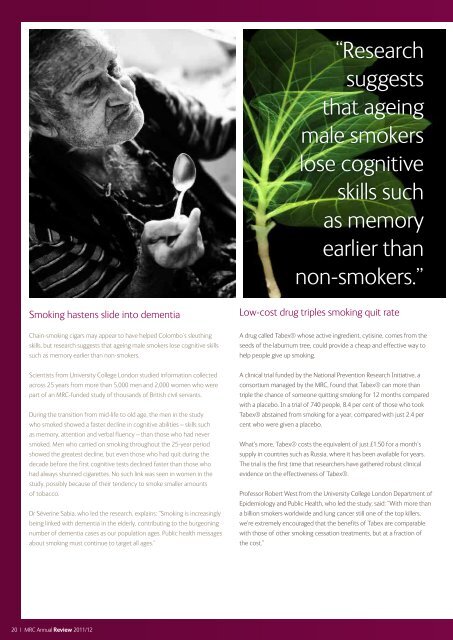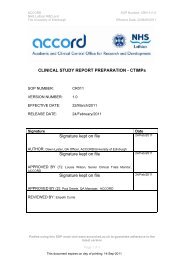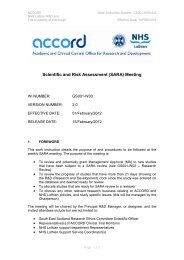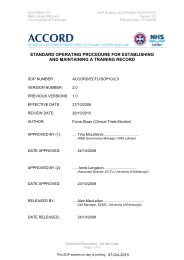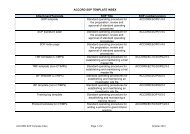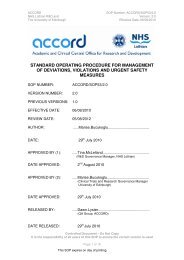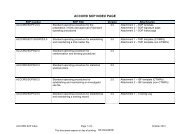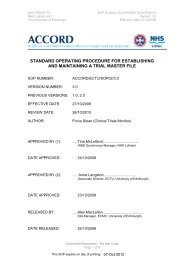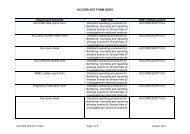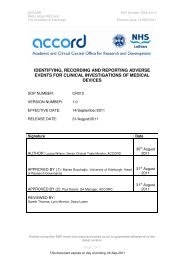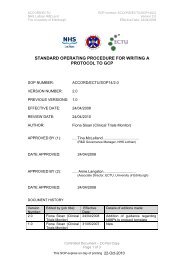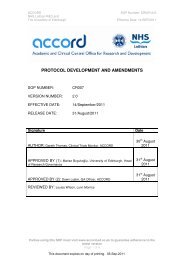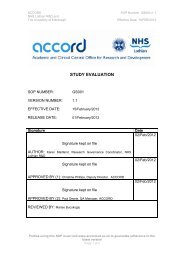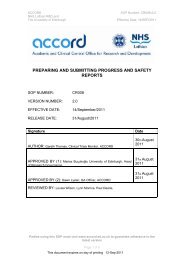Advancing medicine, changing lives - Medical Research Council
Advancing medicine, changing lives - Medical Research Council
Advancing medicine, changing lives - Medical Research Council
Create successful ePaper yourself
Turn your PDF publications into a flip-book with our unique Google optimized e-Paper software.
“<strong>Research</strong><br />
suggests<br />
that ageing<br />
male smokers<br />
lose cognitive<br />
skills such<br />
as memory<br />
earlier than<br />
non-smokers.”<br />
Smoking hastens slide into dementia Low-cost drug triples smoking quit rate Weight at 18 linked to cancer decades later Caesareans on the rise among affluent<br />
Chain-smoking cigars may appear to have helped Colombo’s sleuthing<br />
skills, but research suggests that ageing male smokers lose cognitive skills<br />
such as memory earlier than non-smokers.<br />
Scientists from University College London studied information collected<br />
across 25 years from more than 5,000 men and 2,000 women who were<br />
part of an MRC-funded study of thousands of British civil servants.<br />
During the transition from mid-life to old age, the men in the study<br />
who smoked showed a faster decline in cognitive abilities – skills such<br />
as memory, attention and verbal fluency – than those who had never<br />
smoked. Men who carried on smoking throughout the 25-year period<br />
showed the greatest decline, but even those who had quit during the<br />
decade before the first cognitive tests declined faster than those who<br />
had always shunned cigarettes. No such link was seen in women in the<br />
study, possibly because of their tendency to smoke smaller amounts<br />
of tobacco.<br />
Dr Séverine Sabia, who led the research, explains: “Smoking is increasingly<br />
being linked with dementia in the elderly, contributing to the burgeoning<br />
number of dementia cases as our population ages. Public health messages<br />
about smoking must continue to target all ages.”<br />
A drug called Tabex® whose active ingredient, cytisine, comes from the<br />
seeds of the laburnum tree, could provide a cheap and effective way to<br />
help people give up smoking.<br />
A clinical trial funded by the National Prevention <strong>Research</strong> Initiative, a<br />
consortium managed by the MRC, found that Tabex® can more than<br />
triple the chance of someone quitting smoking for 12 months compared<br />
with a placebo. In a trial of 740 people, 8.4 per cent of those who took<br />
Tabex® abstained from smoking for a year, compared with just 2.4 per<br />
cent who were given a placebo.<br />
What’s more, Tabex® costs the equivalent of just £1.50 for a month’s<br />
supply in countries such as Russia, where it has been available for years.<br />
The trial is the first time that researchers have gathered robust clinical<br />
evidence on the effectiveness of Tabex®.<br />
Professor Robert West from the University College London Department of<br />
Epidemiology and Public Health, who led the study, said: “With more than<br />
a billion smokers worldwide and lung cancer still one of the top killers,<br />
we’re extremely encouraged that the benefits of Tabex are comparable<br />
with those of other smoking cessation treatments, but at a fraction of<br />
the cost.”<br />
Many people have ‘puppy fat’ as a teenager, but research suggests that<br />
carrying excess weight in our late teenage years poses more of a longterm<br />
health risk than we might think.<br />
Public health researchers from the MRC/CSO Social and Public Health<br />
Sciences Unit (SPHSU) in Glasgow have discovered a link between men<br />
being overweight or obese at age 18 and death from cancer in later<br />
life. This link was apparent even if people reduced their weight during<br />
middle age.<br />
The MRC researchers collaborated with colleagues at University College<br />
London and Harvard School of Public Health to analyse the medical<br />
records of around 20,000 male graduates who attended Harvard<br />
between 1916 and 1950.<br />
They found that the men in the study who had the highest body<br />
mass index (BMI) at age 18 were 35 per cent more likely to die from<br />
cancer than those with lower BMIs. The associations between weight<br />
and cancer were particularly strong for lung, skin, oesophageal and<br />
urogenital (kidney, bladder, prostate and testicular) cancers.<br />
SPHSU’s Dr Linsay Gray, lead author of the study, says: “The message<br />
here is really clear: keeping your weight healthy as a young adult can<br />
significantly reduce your chance of developing cancer. These findings<br />
point worryingly to a greater future burden of cancer.”<br />
<strong>Research</strong> has shown that better off mothers in Scotland are more likely<br />
to have their babies by planned Caesarean section than mothers living<br />
in poorer circumstances. Emergency Caesarean sections, however, are<br />
equally distributed across the social spectrum.<br />
The findings mark a sea change in practice compared with 30<br />
years ago, when those from poorer backgrounds were more likely<br />
to have Caesarean sections, both planned and emergency.<br />
<strong>Research</strong>ers from the MRC/Chief Scientist Office Social and Public<br />
Health Sciences Unit in Glasgow used patient records of more than<br />
350,000 mothers in Scotland and examined who gave birth by<br />
Caesarean section in different time periods spanning 20 years. They<br />
then investigated the social class of the mothers who underwent the<br />
procedure and the level of deprivation of the area they lived in.<br />
Lead scientist Ruth Dundas says: “The disappearance of social trends for<br />
emergency Caesarean section reflects increased equality in healthcare.<br />
However this does not explain the differences seen for elective section<br />
rates. It is important to ensure that the clinical decision-making process<br />
is the same for all women, regardless of their background.”<br />
20 | MRC Annual Review 2011/12 MRC Annual Review 2011/12 | 21


